As more businesses shift their focus to operating online, the demand for skilled professionals in ecommerce continues to rise. Whether you're looking to break into digital marketing, data analysis, or user experience design, there's a role for every skill set.
If you're ready to find out which positions are leading the way in 2024 (and will continue for years to come) you’ve come to the right place. Keep reading and discover the best ecommerce jobs of 2024.
What skills do you need for ecommerce?
An ecommerce job involves managing, optimizing, and supporting the online retail operations of a company, ensuring that all marketing is dialed in, transactions run smoothly, and the services are fulfilled. These roles can vary widely, but they all focus on selling or marketing products or services online, enhancing user experience, and maximizing revenue.
Ecommerce jobs are constantly evolving roles that require a combination of technical, creative, and operational skills to succeed in the increasingly competitive online market. This type of role is usually one that helps in areas such as:
- Website management: Involves building, maintaining, or enhancing online platforms for companies, managing the user interface, optimizing the website’s speed, or keeping product listings up to date.
- Digital marketing: Focus on driving traffic and converting visitors into customers.
- Customer experience & support: Work on managing customer interactions, addressing returns and refunds, and collecting feedback to continually improve processes and identify potential pain points.
- Product management: Professionals in this area work by overseeing product strategy, which includes deciding which products to sell, setting competitive prices, and collaborating with suppliers, wholesalers, or manufacturers for inventory availability.
- Analytics and data optimization: Involves understanding customer behavior, optimizing marketing strategies, and improving the overall shopping experience.
- Supply chain & logistics: Focus on ensuring that customers receive their orders on time, usually by managing inventory levels, working with fulfillment centers, and optimizing warehousing.
- Technology integration: Roles in this area might involve managing integrations with payment gateways, inventory management systems, and CRM (customer relationship management) tools.
Who’s hiring for ecommerce jobs?
More and more organizations are focusing on hiring ecommerce professionals in different areas to meet different business needs. When it comes to who is hiring for ecommerce jobs, it falls into:
Brands
We’re talking about major retail brands like Nike and Adidas, DTC (direct-to-consumer) companies, and online-only stores. With the explosion of online shopping, brands are constantly seeking new talent to improve their ecommerce platforms and customer experiences. Teams are hired to handle everything from product management and digital marketing to customer support and logistics.
Working directly for a brand offers a chance to shape its digital presence and ecommerce strategies, also providing opportunities for creative input on product launches, marketing campaigns, and user experience improvements.
Agencies
Companies like digital marketing agencies, UX/UI digital firms, and ecommerce development agencies. Agencies that specialize in ecommerce solutions hire across various roles, from SEO specialists to website developers and ecommerce strategists. These companies typically manage multiple client accounts, providing digital solutions tailored to each brand’s needs.
B2B SaaS
Software companies providing ecommerce platforms and tools for other businesses (B2B) often hire for roles such as product managers, data analysts, customer success managers, and software engineers. Their core business revolves around providing ecommerce solutions to other businesses, ranging from small entrepreneurs to large enterprises.
Companies like Shopify and BigCommerce are good examples, particularly focusing on helping other businesses set up and scale their online stores, offering both software and expertise to thrive in the ecommerce space.
Social media networks
With a growing focus on social commerce and advertising features, social media platforms have become vital sales channels for ecommerce brands, and they’re constantly hiring for roles like digital marketing specialists, ad managers, and others.
For example, Meta focuses on ads and optimizing sales through Facebook and Instagram Shops, while TikTok has pushed shoppable ads and influencer-driven sales, all of these platforms (and the companies behind them) are in constant need of ecommerce professionals who understand what’s currently going on in the industry.
The best ecommerce jobs of 2025
Here are some of the best ecommerce jobs in 2024:
Ecommerce manager
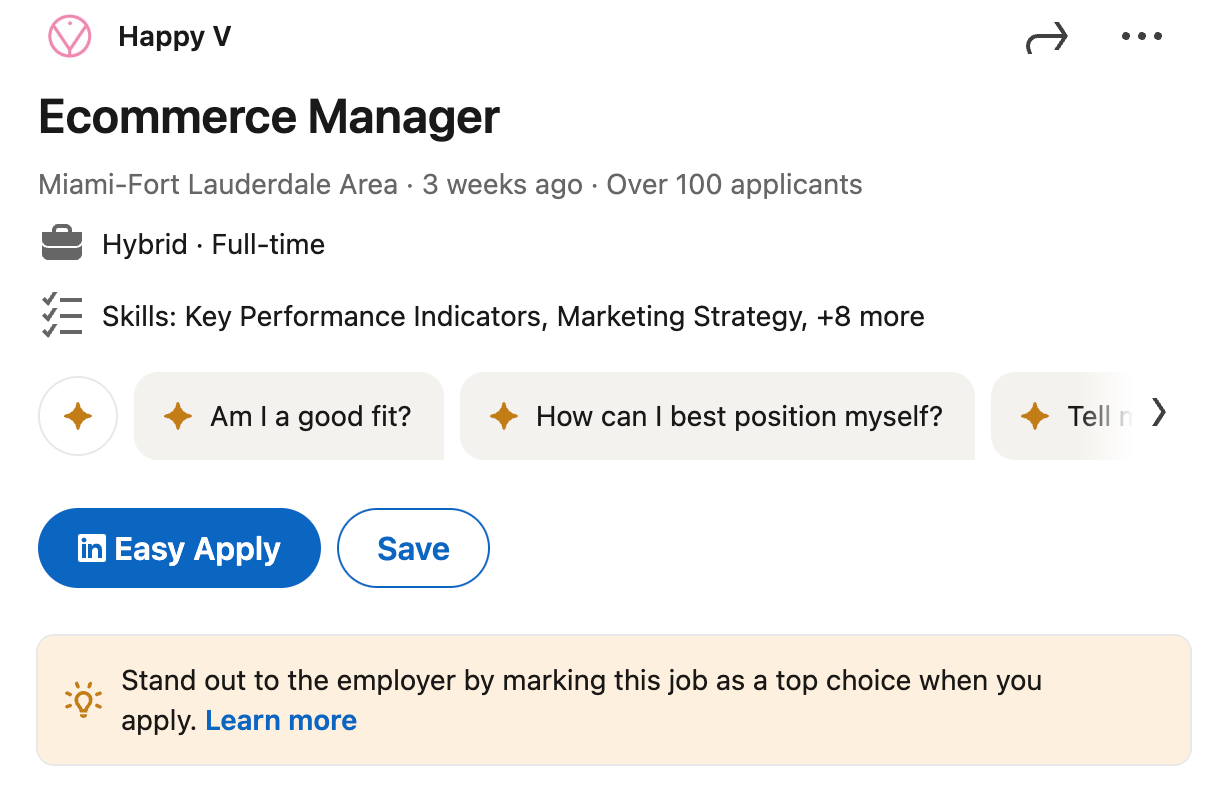
Companies need managers who can run and optimize their ecommerce operations for global audiences. So, the ecommerce manager is the one who oversees all online sales activities, managing the entire digital operation. This role is about optimizing every aspect of the customer’s shopping experience and driving revenue growth.
This is a job that requires a lot of knowledge in all the basic areas of ecommerce, so it’s best suited for experienced professionals.
Common responsibilities of this job include:
- Developing and executing marketing strategies.
- Managing online merchandising, promotions, and digital marketing campaigns.
- Monitoring KPIs such as conversion rates, customer retention, and cart abandonment.
Salary expectations: According to Glassdoor, the estimated median pay for an ecommerce manager is $111,788 per year.
Digital marketing specialist/media buyer

Companies are investing heavily in personalized, targeted digital advertising to drive sales. Digital marketing specialists—the “media buyers”—handle these campaigns, focusing on increasing web traffic and converting visitors into buyers. These professionals focus on purchasing targeted ad spaces on platforms like Google, Facebook, Instagram, or TikTok to optimize marketing campaigns.
Common responsibilities of this job include:
- Creating and managing pay-per-click (PPC) and social media ad campaigns.
- Optimizing campaigns for maximum return on investment (ROI) and tracking metrics like CPA (Cost per Acquisition).
- Analyzing consumer behavior to adjust ad targeting and creative strategies.
Salary expectations: The estimated median pay for a Digital Media Buyer is $85,170 per year, with an average salary of $70,120 per year, according to Glassdoor.
Data analyst

As data continues to drive business decisions in the internet age, companies need skilled analysts to navigate consumer behavior and optimize performance. Ecommerce data analysts gather and interpret this data to help businesses make informed decisions about everything from marketing to inventory management. Insights from this type of role are crucial for improving the customer journey and optimizing sales strategies.
Common responsibilities of this job include:
- Analyzing customer behavior patterns to improve user experience and conversion rates.
- Monitoring website traffic, sales performance, and ROI for marketing campaigns.
- Providing actionable insights to improve product selection, pricing, and promotions.
Salary expectations: The average salary for an Ecommerce Data Analyst is $67,529 per year in the US, according to Glassdoor.
UX & UI designer

UX & UI designers focus on creating intuitive, visually appealing, and user-friendly interfaces for ecommerce websites and mobile apps. Their job is to ensure a smooth shopping experience that increases conversions.
One thing to keep in mind is that many companies hire UX and UI designers as one and the same, even though the two terms (and positions) are technically different. UI (User Interface) focuses on creating a user-friendly interface, while UX (User Experience) focuses on how the user experiences using a product. A designer can focus on working with UX, UI, or both if they prefer, although it’s not mandatory.
Common responsibilities of this job include:
- Designing website layouts, navigation, and user flows.
- Conducting A/B testing and using customer feedback to make design improvements.
- Collaborating with developers to implement design changes.
Salary expectations: According to Glassdoor, the estimated total pay range for UX and UI Designers at Ecommerce is $98K–$143K per year, which includes base salary and additional pay.
Supply chain & logistics manager
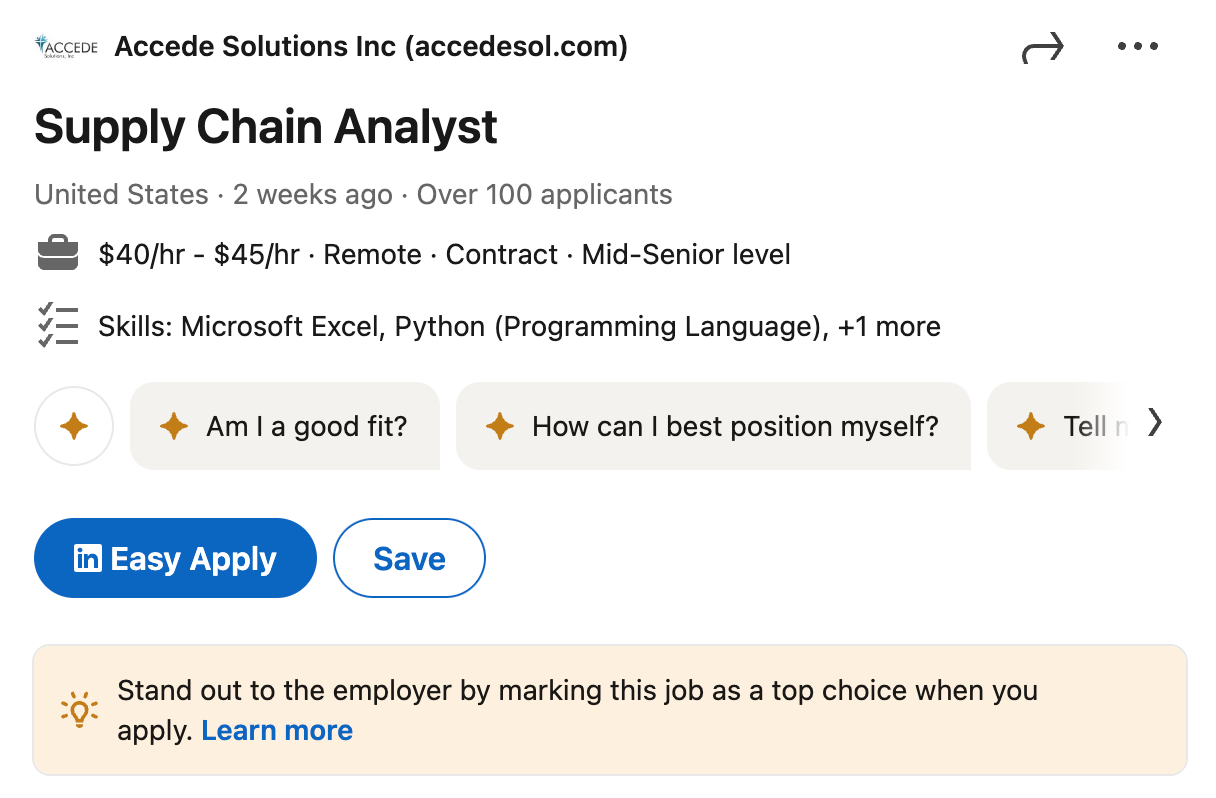
The demand for quicker deliveries and efficient returns makes logistic managers indispensable. These professionals manage the flow of goods from suppliers and customers. In ecommerce, where fast shipping is literally a competitive advantage, supply chain management is critical to meeting customer expectations and being ahead of the competition.
Common responsibilities of this job include:
- Managing inventory levels and forecasting demand.
- Optimizing shipping methods and working with logistics providers.
- Ensuring timely deliveries and managing reverse logistics (returns).
Salary expectations: According to Glassdoor, the estimated total pay for a Logistics Manager is $98,218 per year, with an average salary of $75,193 per year.
Ecommerce copywriter

Copywriting is the process of writing persuasive marketing and promotional materials that motivate customers to take some form of action, such as make a purchase, and in ecommerce, quality persuasive content is essential for standing out and driving sales. Copywriters write product descriptions, landing pages, email campaigns, and ad copy to engage customers and drive conversions.
Common responsibilities of this job include:
- Writing persuasive product descriptions optimized for SEO.
- Creating engaging email and ad copy to drive traffic and sales.
- Collaborating with marketing teams—mostly graphic and web designers—to ensure brand consistency.
Salary expectations: The average salary for an ecommerce copywriter is $67,708 per year in the United States, according to Glassdoor.
SEO content writer

While copywriters focus on writing more commercially oriented texts, content writers are those who feed company blogs with informative content that revolves around the products and services that a business offers. SEO content writers create blog posts, product pages, and other digital content pieces to rank higher on search engines. They focus on integrating relevant keywords to drive organic traffic.
Of course, SEO content writers can work as copywriters, and vice versa, but both positions have specific approaches to writing so that the content produced has the maximum effect on the target audience, whether for sales or to attract organic traffic.
Common responsibilities of this job include:
- Conducting keyword research and optimizing content for SEO.
- Writing and editing blog posts, product descriptions, and guides.
- Keeping up with Google’s algorithm changes to adjust SEO strategies.
Salary expectations: According to Glassdoor, the estimated total pay for a Content Writer is $67,027 per year, with an average salary of $60,778 per year.
Graphic designer

In a visual-drive market, graphic designers are highly sought after by companies. They create visuals for websites, ads, product pages, and social media posts using tools like Adobe Photoshop, Illustrator, and others. The work done by this type of professional influences a brand's identity and helps improve the overall aesthetic of the online shopping experience. Because of this, good graphic designers need to not only dominate graphic tools but have a strong design and artistic sense as well.
Common responsibilities of this job include:
- Designing product images, banners, and social media graphics.
- Creating eye-catching visuals that align with brand guidelines.
- Collaborating with marketing teams (like content writers and copywriters) to create on-brand advertising campaigns.
Salary expectations: According to Salary.com, the average Graphic Designer salary in the United States is $107,561.
Customer experience specialist
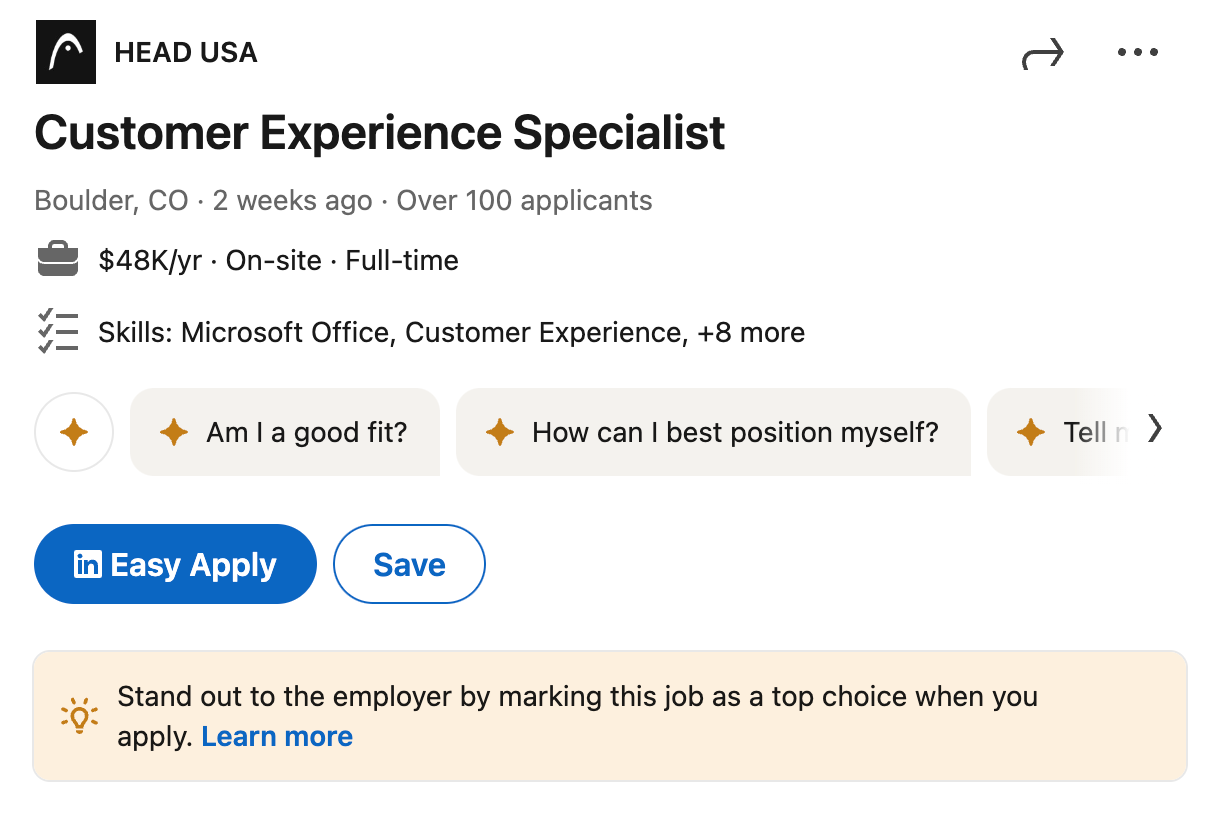
Good customer service can set a brand apart, and customer experience specialists provide exactly that by managing online interactions with customers, ensuring they receive the help they need during and after their purchase. Professionals in this role aim to improve customer satisfaction and loyalty by creating a seamless shopping experience, so deep knowledge of automation tools and customer interaction is vital in this job.
Common responsibilities of this job include:
- Handling customer service inquiries and complaints via email, chat, or social media.
- Monitoring customer feedback to improve processes.
- Managing reviews, returns, and customer satisfaction initiatives.
Salary expectations: According to Glassdoor, the estimated total pay for a Senior Customer Experience Specialist is $78,145 per year in the United States.
Social media manager

Social media is a dominant force in ecommerce marketing, and skilled managers are needed to tap into its potential for driving sales. Social media managers are responsible for a brand’s presence on platforms like Instagram, Facebook, Instagram, LinkedIn, and many others.
Working in this position means creating content, running paid campaigns, and engaging with followers of the brand to drive traffic and sales. It requires extensive knowledge of social media platforms and their features, as well as knowing how to analyze page performance and engagement data on the platforms. Some social media managers work as graphic designers as well (creating the digital art used in the publications) but this is not always the case.
Common responsibilities of this job include:
- Creating social media content that drives engagement and traffic.
- Running paid advertising campaigns across social media platforms.
- Managing brand interactions and engaging with the audience to build a community.
Salary expectations: According to Glassdoor, the estimated total pay for a Social Media Manager is $60,336 per year, with an average salary of $55,350 per year.
Product manager
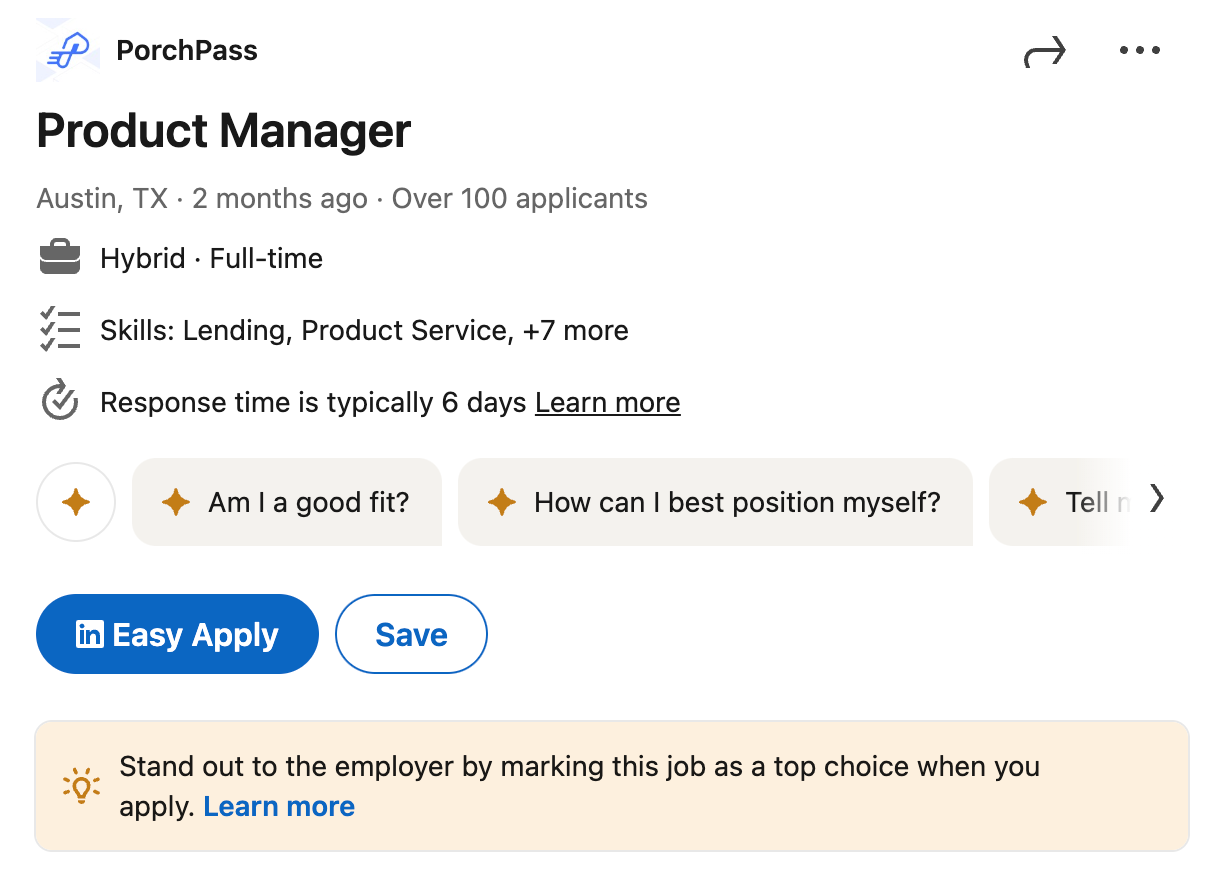
In a highly competitive market, having the right products at the right price can make or break an ecommerce business. Product Managers in ecommerce are responsible for the product assortment offered on the site, including product launches, pricing, and promotions. They oversee the product lifecycle and ensure it aligns with the company’s business goals.
Product Managers need a mix of business expertise, technical knowledge, and strong communication skills because they'll deal with suppliers and customers equally and daily. It’s the job of a product manager to make sure a business has products to sell, and buyers receive what they’re buying.
Common responsibilities of this job include:
- Managing product listings, pricing strategies, and product performance.
- Analyzing market trends and customer feedback to optimize the product lineup.
- Collaborating with suppliers, developers, and marketers for product launches.
Salary expectations: According to Glassdoor, the estimated total pay for a Product Manager is $196,308 per year, with an average salary of $123,542 per year.
What skills should I master to work in ecommerce?
To excel in the ecommerce industry, you need a combination of technical, creative, and business skills. It heavily depends on the job you’re thinking about, of course, but knowing a bit of everything is essential if you want to succeed.
Some of the key skills an ecommerce professional needs are:
Marketing yourself digitally
This includes understanding Search Engine Optimization (SEO) to improve search rankings, running paid ads on platforms like Google Ads or Facebook, and leveraging social media marketing to drive engagement. Email marketing and affiliate marketing are also good tools to master, especially if your work involves customer retention and sales generation.
Analyzing data
Proficiency in tools like Google Analytics, Shopify Analytics, and CRM software is key to analyzing customer behavior, tracking sales performance, and optimizing your marketing efforts. Data-driven decision-making helps you fine-tune your ecommerce strategies for growth.
Copywriting & content creation
Strong copywriting skills are needed to create compelling product descriptions, engaging blogs, and high-converting ads. Content marketing, through blog posts and product pages optimized for SEO, helps drive organic traffic to businesses.
Using ecommerce platforms
Becoming proficient in platforms such as Shopify, WooCommerce, and Magento is crucial for managing online sales platforms, for example. This includes setting up product listings, handling payments, integrating plugins, and troubleshooting issues.
How to find the best ecommerce jobs
To find the best ecommerce jobs, there are a few strategies and platforms you can use, such as:
Use LinkedIn
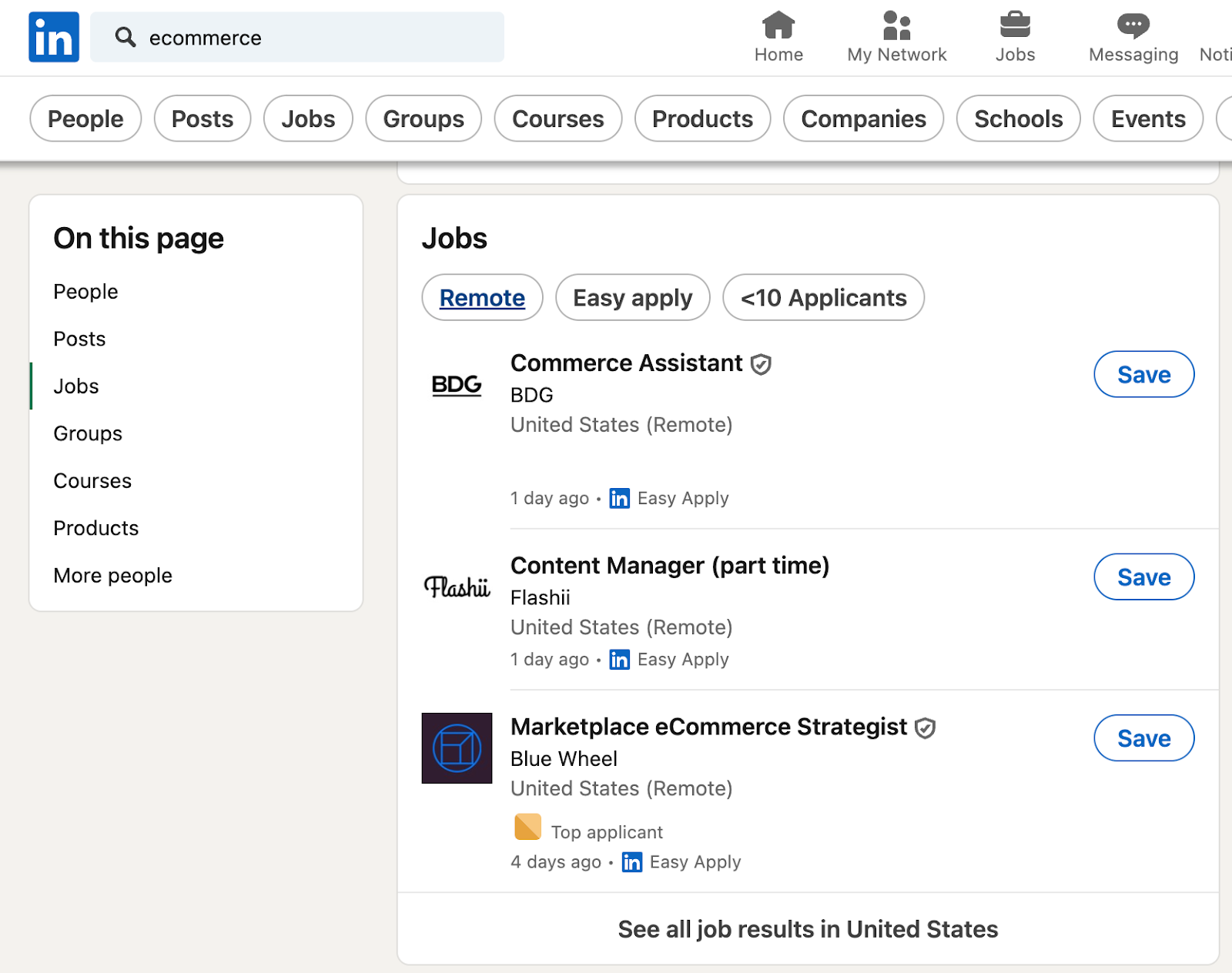
LinkedIn works as a “social media for jobseekers”, where many companies post job offers every day. You can use LinkedIn to connect with industry professionals, follow ecommerce companies, and apply for job postings. You can use filters to search for specific jobs that fit your expertise level and needs.
Search on Indeed or Glassdoor
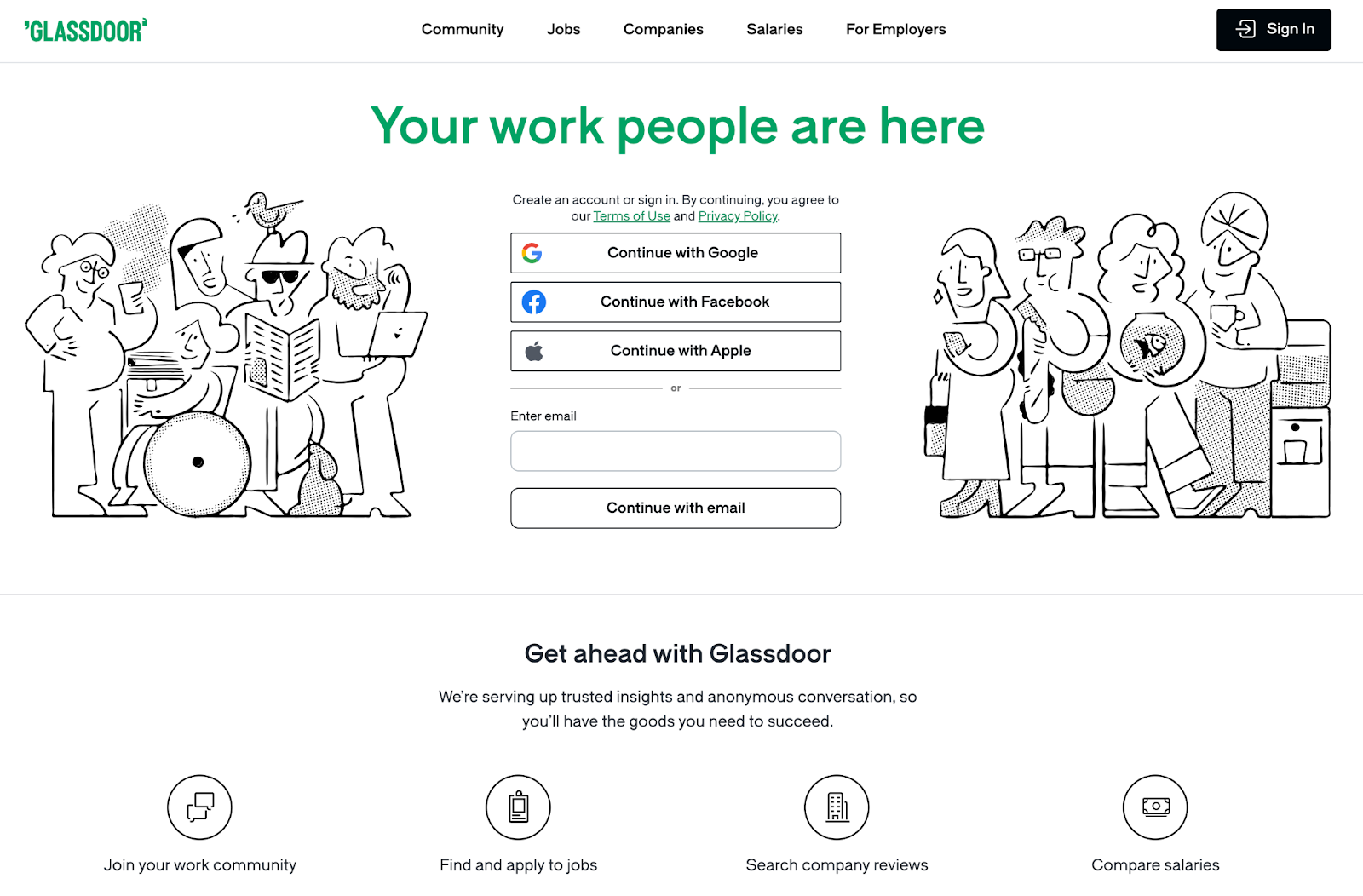
Indeed and Glassdoor are two of the largest websites dedicated to job seeking. They curate job posts from across the internet and present them in lists directly to job seekers. They also feature reviews of companies and salary insights, which can be helpful when deciding where to apply.
Go directly to the company’s career pages
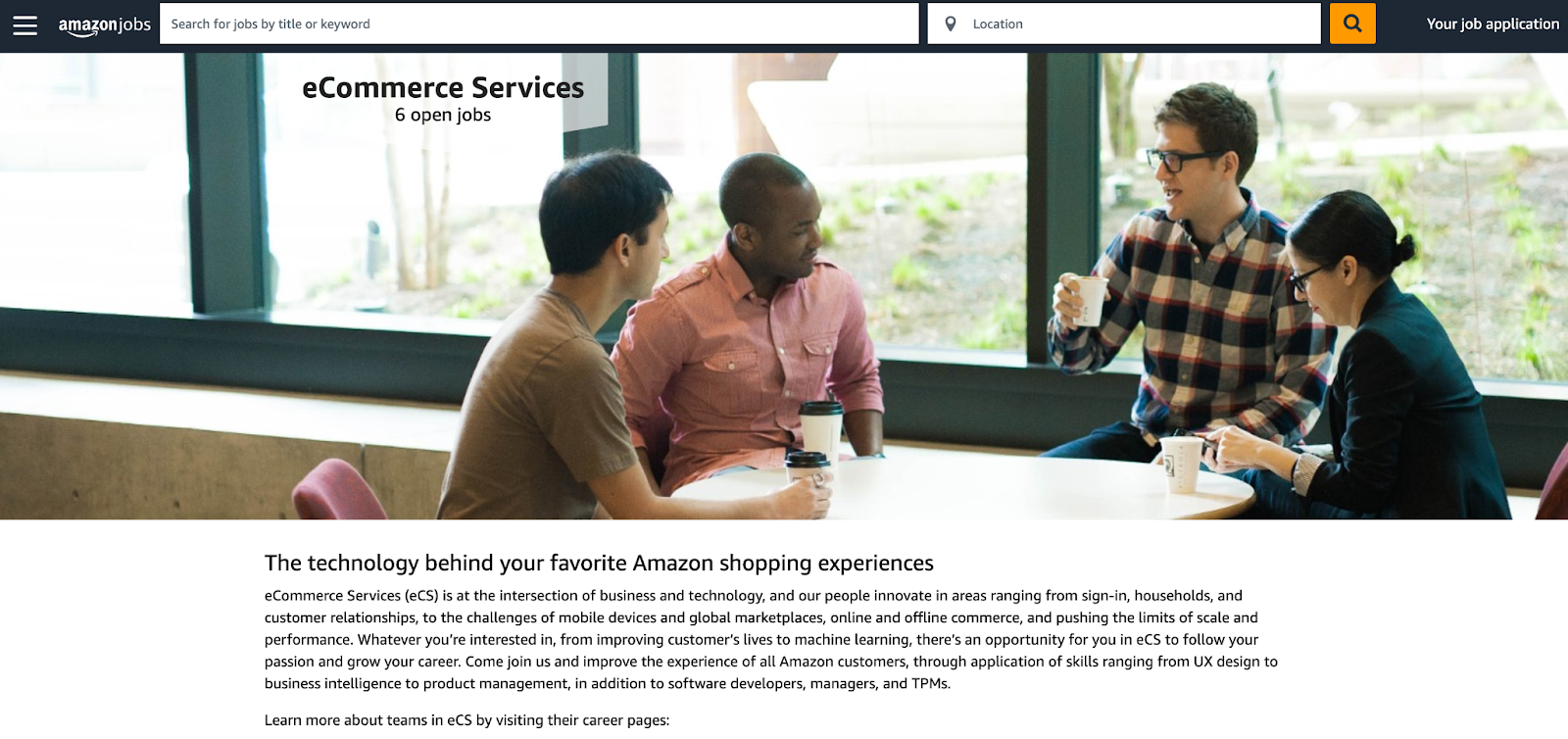
If there’s a specific brand or agency you want to work with, regularly checking their career sections for job or internship listings is vital to securing a job position the moment it becomes available. Many ecommerce brands list roles directly on their websites before posting on LinkedIn and other major job boards.
Practice networking
Networking is a quick and direct way to get the best ecommerce jobs directly from the "big players" in the field. You can join online forums, LinkedIn groups, or communities focused on ecommerce, spaces to meet professionals and build connections. Many jobs, internships, and even business opportunities can come through referrals, so practice networking.
Learn new skills with Whop and find the job of your dreams
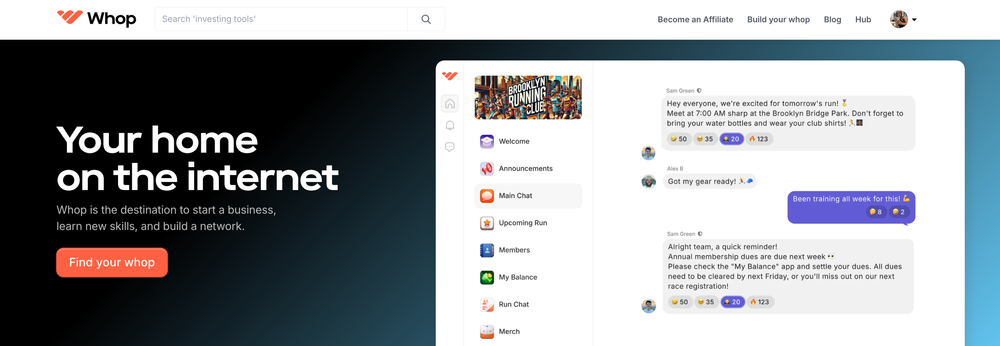
In ecommerce, cutting-edge knowledge and experience are the keys to success. But of course, with so many skills to learn and develop, it can be a bit overwhelming for those just starting. The good news is that no matter what area you want to work with, Whop has exactly what you need to learn, succeed, and become a true ecommerce professional.
Whop brings together hundreds of ecommerce masters ready to share knowledge about everything you can imagine through online courses, guides, and even exclusive communities for individuals who, like you, seek to learn more and more about digital marketing, online commerce, and much more. Here you’ll find the right guide to teach you the skill you’re missing for that perfect job you’ve been dreaming about.
Are you ready to expand your knowledge and become a master in your field? Explore Whop and start learning today.
Best ecommerce jobs in 2024 FAQs
The frequently asked questions about the best ecommerce jobs of 2024.
Do I need an academic degree to work in ecommerce?
While having a degree in fields like marketing, business, or data analysis can be helpful, it's not always necessary to work in ecommerce. Many successful professionals in this industry build their careers through practical experience, certifications, and skills gained from online courses.
Why you should trust us
Joe Niehaus is an ecommerce specialist and senior content writer at Whop, bringing years of expertise in copywriting and content writing for ecommerce in numerous businesses. His knowledge has also been highlighted in renowned outlets such as Business Insider, GQ, and Travel + Leisure.





